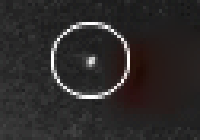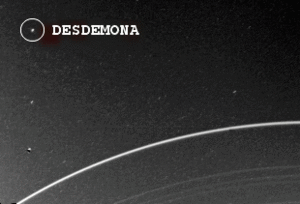Desdemona (moon) facts for kids

Discovery image of the Uranian moon Desdemona
|
|
| Discovery | |
|---|---|
| Discovered by | Stephen P. Synnott / Voyager 2 |
| Discovery date | January 13, 1986 |
| Orbital characteristics | |
|
Mean orbit radius
|
62,658.364 ± 0.047 km |
| Eccentricity | 0.00013 ± 0.000070 |
| 0.473649597 ± 0.000000014 d | |
| Inclination | 0.11252 ± 0.037° (to Uranus' equator) |
| Satellite of | Uranus |
| Physical characteristics | |
| Dimensions | 90 × 54 × 54 km |
|
Mean radius
|
34 ± 4 km |
| ~14,500 km² | |
| Volume | ~164,000 km³ |
| Mass | ~2.3×1017 kg |
|
Mean density
|
~1.3 g/cm³ assumed |
| ~0.011 m/s2 | |
| ~0.027 km/s | |
| synchronous | |
| zero | |
| Albedo | 0.08 ± 0.01 |
| Temperature | ~64 K |
Desdemona is one of the inner moons of the planet Uranus. It was discovered on January 13, 1986. Scientists found Desdemona in pictures taken by the Voyager 2 spacecraft.
It was first called S/1986 U 6. Later, it was officially named Desdemona. This name comes from a character in William Shakespeare's famous play Othello. It is also known as Uranus X.
Desdemona's Family of Moons
Desdemona is part of a group of moons called the Portia Group. This group includes several other moons orbiting Uranus. They are Bianca, Cressida, Juliet, Portia, Rosalind, Cupid, Belinda, and Perdita.
These moons are thought to have similar orbits around Uranus. They also reflect light in similar ways. This suggests they might have formed from the same material.
What We Know About Desdemona
Scientists do not know much about Desdemona. We know its orbit around Uranus. We also know its average size, which is about 34 km (21 miles) across.
Its surface reflects about 8% of the sunlight that hits it. This is called its geometric albedo. This means Desdemona is quite dark, like charcoal.
Desdemona's Appearance
The images from Voyager 2 show Desdemona as a stretched-out object. It is shaped a bit like a rugby ball. The longest part of its shape points directly towards Uranus.
Scientists have measured its shape. The ratio of its longest side to its shortest side is about 0.6. This confirms its stretched appearance. Its surface looks grey in color.
See also
 In Spanish: Desdémona (satélite) para niños
In Spanish: Desdémona (satélite) para niños


